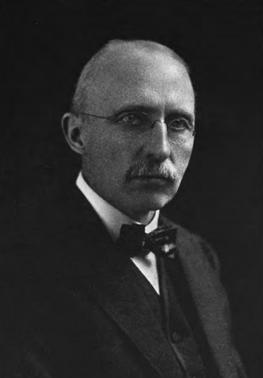Herbert L. Osgood facts for kids
Quick facts for kids
Herbert Levi Osgood
|
|
|---|---|
 |
|
| Born | April 9, 1855 Canton, Maine, US |
| Died | September 11, 1918 (aged 63) New York City, US |
| Occupation | Historian |
| Nationality | American |
| Education | Amherst College (BA) Columbia University (PhD) |
| Period | 1886–1924 |
| Subject |
|
| Relatives | Ernest Staples Osgood (nephew) Dixon Ryan Fox (son-in-law) |
Herbert Levi Osgood (born April 9, 1855, in Canton, Maine – died September 11, 1918, in New York City) was an American historian. He was an expert on the early history of the American colonies.
As a professor at Columbia University, he guided many students who later became important historians themselves. Osgood was a key figure among the "Imperial historians." This group studied the British Empire in the 1700s. They often looked at how the empire worked from the inside.
Contents
Who Was Herbert Levi Osgood?
Early Life and Education
Herbert Osgood was born in Maine. He went to Amherst College and graduated in 1877. He continued his studies at Amherst and also took classes at Yale University. He even spent a year studying in Berlin, Germany.
After returning to the United States, Osgood taught at Brooklyn High School. He also went back to Columbia University for more studies. He earned his doctorate degree from Columbia in 1889. Before that, he had already written two well-received articles. These articles were about "Scientific Socialism" and "Scientific Anarchism."
Becoming a Professor
After finishing his studies, Osgood traveled to London. There, he studied old documents about colonial America. He looked at records in places like the British Museum.
When he came back to the U.S., he worked as an assistant at Columbia for six years. In 1891, he started teaching a course on the "Political History of the Colonies and the American Revolution." By 1896, Osgood became a full professor. He held this position until he passed away.
His son-in-law, Dixon Ryan Fox, was also a historian. Fox wrote a book about Osgood's life in 1924. Osgood's nephew, Ernest Staples Osgood, was also a well-known historian. He focused on the history of the American West.
How Did Osgood Study History?
Focus on Original Sources
Osgood wrote many books and articles about early American history. He was known for carefully looking at original documents. These are called primary sources. His work often described these sources in great detail. He wanted to give other historians a clear picture of the facts.
His style was different from some other historians. For example, Edward Channing wrote books that were easier for everyone to read. But Osgood focused more on facts and institutions. He once said that an historian's job is not to make history "interesting." Instead, it is to be accurate.
The "Imperial School" of Historians
Osgood was part of a group called the "Imperial School" historians. Other members included Charles McLean Andrews and George Louis Beer. This group looked at the colonial period differently. They focused on how the colonies were connected to Great Britain.
Osgood believed that earlier studies were often biased. They made the colonists seem like heroes and the British seem evil. He wanted to show a more balanced view. He thought it was important to understand the ties between the colonies and the British Empire.
His Major Books
To write his books, Osgood visited archives in different states and in Britain. He spent years examining original documents. His first big work was a three-volume series. It was called The American Colonies in the Seventeenth Century (1904-1907). This series received good reviews from other historians.
After that, he started a four-volume follow-up series. It was called The American Colonies in the Eighteenth Century. He had almost finished it when he died. His son-in-law, Dixon Ryan Fox, helped edit the manuscripts. The books were published after Osgood's death in 1924.
Other Contributions
Osgood also helped with a project to survey historical records. This was for the American Historical Association. He wrote a very detailed report on the records in New York. This report was so good that it was published separately.
He also edited an eight-volume collection of old city records. These were the Minutes of the Common Council of the City of New York, 1675-1776. Even with all this work, Osgood kept teaching and guiding students at Columbia. Some of his famous students included William Robert Shepherd and Arthur Meier Schlesinger.
Historian Gwenda Morgan said that Osgood helped people understand the colonies better. He showed how complex the British Empire was. He also pointed out that American factors shaped the colonies' growth. His work is still valuable for historians today. It helps them understand the colonies' place in the early British Empire.
Works
- Osgood, Herbert L. The American colonies in the seventeenth century, (3 vol 1904-07) vol. 1 online; vol 2 online; vol 3 online
 | Chris Smalls |
 | Fred Hampton |
 | Ralph Abernathy |

